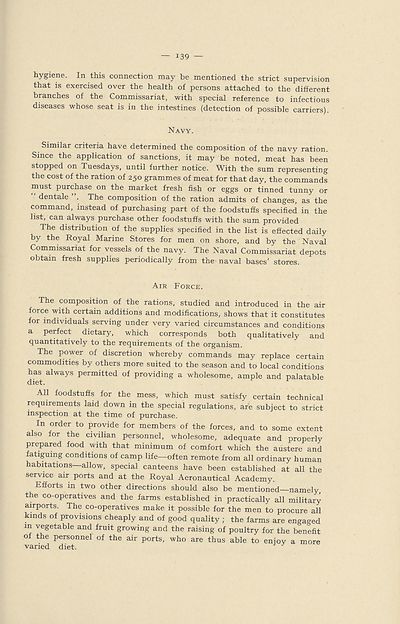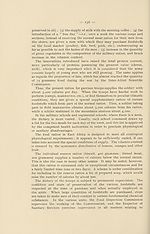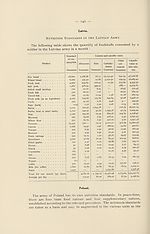Download files
Complete book:
Individual page:
Thumbnail gallery: Grid view | List view

139 ~
hygiene. In this connection may be mentioned the strict supervision
that is exercised over the health of persons attached to the different
branches of the Commissariat, with special reference to infectious
diseases whose seat is in the intestines (detection of possible carriers).
Navy.
Similar criteria have determined the composition of the navy ration.
Since the application of sanctions, it may be noted, meat has been
stopped on Tuesdays, until further notice. With the sum representing
the cost of the ration of 250 grammes of meat for that day, the commands
must purchase on the market fresh fish or eggs or tinned tunny or
“ dentale ”• The composition of the ration admits of changes, as the
command, instead of purchasing part of the foodstuffs specified in the
list, can always purchase other foodstuffs with the sum provided
The distribution of the supplies specified in the list is effected daily
by the Royal Marine Stores for men on shore, and by the Naval
Commissariat for vessels of the navy. The Naval Commissariat depots
obtain fresh supplies periodically from the naval bases’ stores.
Air Force.
The composition of the rations, studied and introduced in the air
force with certain additions and modifications, shows that it constitutes
for individuals serving under very varied circumstances and conditions
a perfect dietary, which corresponds both qualitatively and
quantitatively to the requirements of the organism.
The power of discretion whereby commands may replace certain
commodities by others more suited to the season and to local conditions
has always permitted of providing a wholesome, ample and palatable
diet.
All foodstuffs for the mess, which must satisfy certain technical
requirements laid down in the special regulations, are subject to strict
inspection at the time of purchase.
In order to provide for members of the forces, and to some extent
also for the civilian personnel, wholesome, adequate and properly
prepared food with that minimum of comfort which the austere and
fatiguing conditions of camp life—often remote from all ordinary human
habitations—allow, special canteens have been established at all the
service air ports and at the Royal Aeronautical Academy.
Efforts in two other directions should also be mentioned—namely,
the co-operatives and the farms established in practically all military
airports. The co-operatives make it possible for the men to procure all
kinds of provisions cheaply and of good quality ; the farms are engaged
in vegetable and fruit growing and the raising of poultry for the benefit
of the personnel of the air ports, who are thus able to enjoy a more
varied diet.
hygiene. In this connection may be mentioned the strict supervision
that is exercised over the health of persons attached to the different
branches of the Commissariat, with special reference to infectious
diseases whose seat is in the intestines (detection of possible carriers).
Navy.
Similar criteria have determined the composition of the navy ration.
Since the application of sanctions, it may be noted, meat has been
stopped on Tuesdays, until further notice. With the sum representing
the cost of the ration of 250 grammes of meat for that day, the commands
must purchase on the market fresh fish or eggs or tinned tunny or
“ dentale ”• The composition of the ration admits of changes, as the
command, instead of purchasing part of the foodstuffs specified in the
list, can always purchase other foodstuffs with the sum provided
The distribution of the supplies specified in the list is effected daily
by the Royal Marine Stores for men on shore, and by the Naval
Commissariat for vessels of the navy. The Naval Commissariat depots
obtain fresh supplies periodically from the naval bases’ stores.
Air Force.
The composition of the rations, studied and introduced in the air
force with certain additions and modifications, shows that it constitutes
for individuals serving under very varied circumstances and conditions
a perfect dietary, which corresponds both qualitatively and
quantitatively to the requirements of the organism.
The power of discretion whereby commands may replace certain
commodities by others more suited to the season and to local conditions
has always permitted of providing a wholesome, ample and palatable
diet.
All foodstuffs for the mess, which must satisfy certain technical
requirements laid down in the special regulations, are subject to strict
inspection at the time of purchase.
In order to provide for members of the forces, and to some extent
also for the civilian personnel, wholesome, adequate and properly
prepared food with that minimum of comfort which the austere and
fatiguing conditions of camp life—often remote from all ordinary human
habitations—allow, special canteens have been established at all the
service air ports and at the Royal Aeronautical Academy.
Efforts in two other directions should also be mentioned—namely,
the co-operatives and the farms established in practically all military
airports. The co-operatives make it possible for the men to procure all
kinds of provisions cheaply and of good quality ; the farms are engaged
in vegetable and fruit growing and the raising of poultry for the benefit
of the personnel of the air ports, who are thus able to enjoy a more
varied diet.
Set display mode to:
![]() Universal Viewer |
Universal Viewer | ![]() Mirador |
Large image | Transcription
Mirador |
Large image | Transcription
Images and transcriptions on this page, including medium image downloads, may be used under the Creative Commons Attribution 4.0 International Licence unless otherwise stated. ![]()
| League of Nations > Economic and financial section > Problem of nutrition > (141) |
|---|
| Permanent URL | https://digital.nls.uk/190925595 |
|---|
| Shelfmark | LN.II |
|---|
| Description | Over 1,200 documents from the non-political organs of the League of Nations that dealt with health, disarmament, economic and financial matters for the duration of the League (1919-1945). Also online are statistical bulletins, essential facts, and an overview of the League by the first Secretary General, Sir Eric Drummond. These items are part of the Official Publications collection at the National Library of Scotland. |
|---|---|
| Additional NLS resources: |
|

